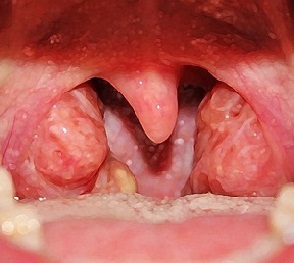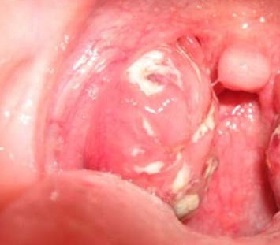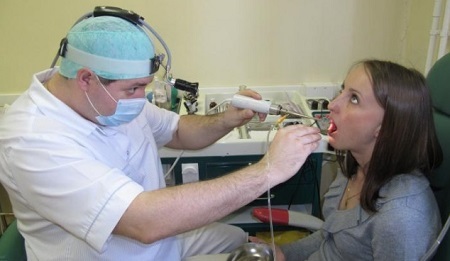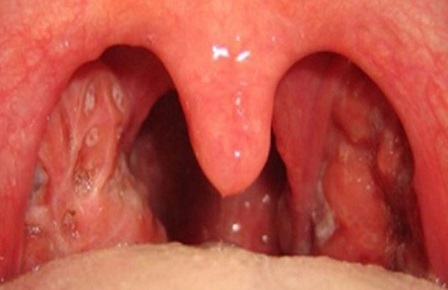 Tonsillitis affects the tonsils of the palate, thereby causing inflammation in them. Refers to a group of infectious diseases, the causative agent of which is a viral or bacterial infection.
Tonsillitis affects the tonsils of the palate, thereby causing inflammation in them. Refers to a group of infectious diseases, the causative agent of which is a viral or bacterial infection.
Acute tonsillitis is more often called angina, and its chronic form is diagnosed in 10-15% of the world's population. Characteristic symptoms of tonsillitis are manifested in an increase in body temperature, which is accompanied by pain in the mountain of varying intensity.
Causes of
The disease can occur in acute or chronic form. The causative agent of tonsillitis can be the following bacteria: staphylococcus, meningococcus, anaerobic, streptococcus, pnevomokokk, in rare cases, a rod of typhoid fever. The source of infection in angina is a patient with various forms of acute diseases and a carrier of pathogenic microorganisms.
Predisposing factors: hypothermia, decreased immunity, damage to the tonsils, nasal breathing, chronic inflammatory processes in the oral cavity, nose and paranasal sinuses. Most often, tonsillitis develops after a previous acute respiratory viral infection. Pathogens ARVI reduce the protective functions of the epithelial cover and promote the invasion of streptococci.
In children, tonsillitis is often the result of various diseases: adenoids, polyps, congenital curvature of the nasal septum, which breaks the breath.
With improper treatment or lack of it, a weakened organism or the presence of other chronic diseases, acute tonsillitis can pass into a chronic form characterized by periodic exacerbations. In a break between exacerbations a person can feel almost healthy, and even with an objective examination by an ENT doctor, he does not always find pathological changes in the tonsils themselves.
Symptoms of tonsillitis
 Tonsillitis and its symptoms will vary significantly, depending on the form of the process. The incubation period of tonsillitis is very short, only 1-2 days. After that, adults and children begin to develop a classic symptomatology for angina.
Tonsillitis and its symptoms will vary significantly, depending on the form of the process. The incubation period of tonsillitis is very short, only 1-2 days. After that, adults and children begin to develop a classic symptomatology for angina.
Disease begins suddenly, the first signs of tonsillitis:
- regional enlargement of the lymph nodes;
- sore throat when swallowing;
- high fever, accompanied by chills;
- aches in joints, general weakness;
- headache.
The pain in the throat gradually increases, it becomes constant, reaches a maximum on the second day. When examining the pharynx, one can see flushed, enlarged tonsils, in many patients follicles with pus are observed on them.
Regional lymph nodes increase and become painful. The severity of fever, intoxication and pharyngoscopic picture depend on the form of the disease( catarrhal, lacunar, follicular, etc.).If you are not puzzled with the question in time - how and what to treat tonsillitis, then eventually it is chronic.
Unlike tonsillitis, chronic tonsillitis is more difficult to diagnose, since it can occur without visible symptoms, periodically turning into an acute form.
The most typical symptoms of chronic tonsillitis are:
- the appearance of periodic or persistent pain when swallowing food or saliva;
- frequent episodes of angina and severe illness;
- pain in the zone of submandibular lymph nodes;
- dryness, sagging and sore throat;
- exit of purulent plugs during cough;
- pain in the area of the heart muscle, as well as in the joints of the patient;
- periodic slight increase in temperature.
Chronic tonsillitis is able to flow in compensated and decompensated( with heart, kidneys, joints, chronic intoxication) form. Therefore, do not hesitate, the faster you can cure tonsillitis, the less you get complications. How to do it once and for all, you will tell an experienced specialist.
The most terrible consequence of untreated sore throat is rheumatism, which affects the joints, valvular heart apparatus, leads to the formation of heart defects and the development of heart failure.
Treatment of tonsillitis
As a rule, treatment of tonsillitis is carried out at home with the condition of compliance with bed rest.
Given that the angina in the vast majority of cases is caused by streptococci, then for the treatment of tonsillitis, the doctor is prescribed a course of antibiotics, if necessary - antiviral therapy. In parallel with taking antibiotics, it is necessary to use local antiseptics that relieve pain( Geksoral, Bioparoks, Stop-Angin).
In addition, conservative treatment involves washing the tonsils( to remove purulent plugs) and lubrication with Lugol solution, physiotherapeutic procedures. To eliminate pain and fever, prescribe NSAIDs - Paracetamol, Analgin, Ibuprofen, and others.
A sparing diet rich in vitamins C and B is needed, plenty of drinking. Do not forget about gargling with special preparations, including those based on natural ingredients. If outpatient treatment has not led to success, then the question of surgical intervention is being considered. Most often, tonsils are simply removed as the main source of threat.
It should be remembered that with incorrect treatment of acute tonsillitis or its absence, it is chronic. And in how to treat tonsillitis in a chronic form, the opinions of doctors at the moment diverge. The choice of the treatment regimen in each case depends on the form of chronic tonsillitis, the general condition of the patient, the presence of concomitant diseases, and the like.

Antibiotics for tonsillitis
The administration of antibiotics is justified only when the disease is severe. It is necessary to remember that antibiotics are preparations against bacteria, therefore they are appointed only in the case when bacterial flora acts as causative agents of the disease.
Most likely, you will be prescribed antibacterial drugs from the penicillin group:
- amoxicillin;
- penicillin;
- oxacillin.
If there is an allergy to this component, antibiotics from the macrolide group are prescribed:
- erythromycin;
- clarithromycin;
- azithromycin.
The spectrum of antibacterial drugs for the treatment of acute tonsillitis is very extensive. The final decision on the appropriateness of using this or that remedy should be taken by the doctor. In addition, even a clear improvement in the state of health does not give rise to a violation of diet, diet and stop taking antibiotics. Treatment must necessarily be completed in order to completely destroy the bacteria.
How to treat tonsillitis at home
For maximum effectiveness, treatment at home should simultaneously eliminate unpleasant symptoms, the causes of the ailment and fight infection.
Basic principles of treatment of at home:
- strict bed rest;
- copious drink;
- special diet;
- inhalation and gargling with solutions of antiseptics and decoctions of medicinal herbs;
- irrigation of glands with antiseptic preparations;
- reception of non-steroidal anti-inflammatory drugs to reduce temperature and pain;
- reception of immunomodulators and vitamins;
- administration of appropriate antibiotics as directed by a physician.
With prolonged absence of a positive therapeutic effect or with the development of complications, people are referred to a hospital.

Treatment with folk remedies
The use of folk remedies can be used as a supplement to traditional medicine, it is not recommended to prescribe such treatment yourself, without the advice of a doctor. Of the folk remedies for tonsillitis, rinses of the throat with decoctions and pharmaceuticals are widely used.
- Healing herbs - chamomile, marshmallow, sage, coltsfoot, calendula, decoction of the oak cortex, St. John's wort;
- Pharmacy - Miramistin, Furacilin, Malawit;
- A simple method using - salt, soda and iodine;
- They also make inhalations with decoctions of medicinal herbs( eucalyptus, sage, chamomile, etc.).
Basically, traditional methods of treatment are aimed at reducing inflammatory phenomena in the pharynx, strengthening immunity, and early recovery after illness. As a single method of treatment, folk recipes are not suitable.

How to choose probiotics for the intestines: a list of drugs.

Effective and inexpensive cough syrups for children and adults.

Modern non-steroidal anti-inflammatory drugs.

Review of tablets from the increased pressure of the new generation.
 Antiviral drugs are inexpensive and effective.
Antiviral drugs are inexpensive and effective.



